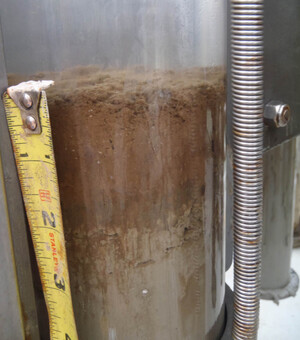 |
| Oily deposit in seabed core sample from the Gulf |
Scientists on a research vessel in the Gulf of Mexico are finding a substantial layer of oily sediment stretching for dozens of miles in all directions. Their discovery suggests that a lot of oil from the Deepwater Horizon didn't simply evaporate or dissipate into the water — it has settled to the seafloor.They've also found recently dead shrimp, worms, and other invertebrates.
"It's all over the place," said one of the research scientists. And they haven't even tested the bottom close to the wellhead yet.
And then there's this from a researcher at LSU who takes exception to the widely reported statement that 75 percent of the spilled oil has disappeared.
The reason is that when he flew over the Gulf of Mexico in late August, he saw "clouds" of oil that the skimmers and dispersants had missed. He also says there are regions where oil has gathered on top of the sediment. It's only a matter of time before some of it washes up on shore again, probably after a storm.
As I said: Great! Why? Because nobody has a clue as to what the long-term effects of this and perhaps other as yet undiscovered effects of the spill are going to be on the ecology of the Gulf, the economy of shoreline region, or the lives of people who live and make their livings there. These latest discoveries, after all, may mean nothing. Perhaps 4 million barrels of oil dumped in the Gulf is basically benign and won't have any lasting effects. Raise your hand if you really believe that.
No comments:
Post a Comment